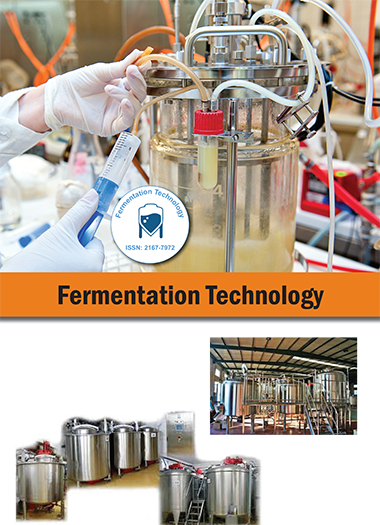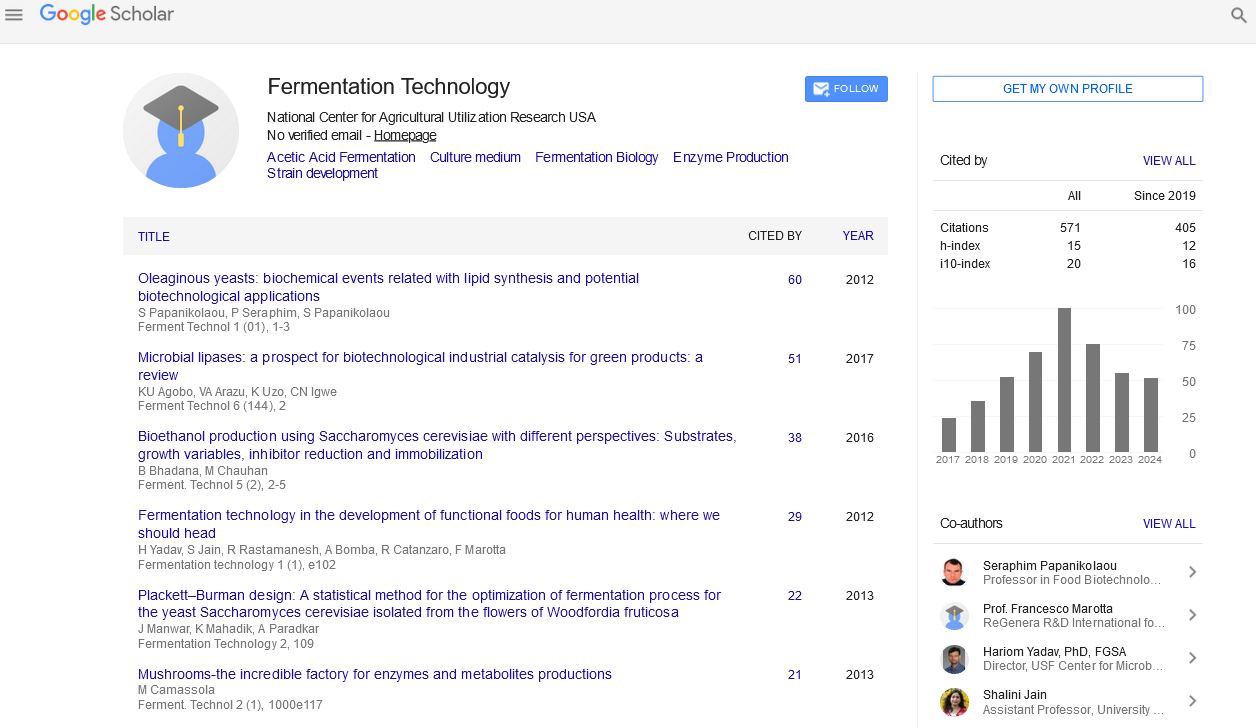Indexed In
- Open J Gate
- Genamics JournalSeek
- Access to Global Online Research in Agriculture (AGORA)
- RefSeek
- Hamdard University
- EBSCO A-Z
- OCLC- WorldCat
- Publons
Useful Links
Share This Page
Journal Flyer

Open Access Journals
- Agri and Aquaculture
- Biochemistry
- Bioinformatics & Systems Biology
- Business & Management
- Chemistry
- Clinical Sciences
- Engineering
- Food & Nutrition
- General Science
- Genetics & Molecular Biology
- Immunology & Microbiology
- Medical Sciences
- Neuroscience & Psychology
- Nursing & Health Care
- Pharmaceutical Sciences
Production of Selenium enriched Saccharomyces cerevisiae using yeast extract peptone dextrose broth
World Congress on Beneficial Microbes: Food, Pharma, Aqua & Beverages Industry
August 25-27, 2015 Valencia, Spain
B Prakash, C Sreenivasa Reddy, S V Rama Rao, A K Panda and M V L N Raju
ICAR, India
Scientific Tracks Abstracts: Ferment Technol
Abstract:
Dietary supplementation of organic Selenium (Se) through Se enriched yeast is common practice. The Saccharomyces cerevisiae (SC) is recognized well for its ability to accumulate and convert inorganic Se to organic Se. However, the concentration of the sodium selenite (inorganic) determines the growth of SC, which is critical in producing the organic Se using SC. Therefore, the present experiment was carried out to optimize the concentration of sodium selenite to produce the maximum yeast cell growth. For that purpose, SC (strain 101) was subjected to various concentrations of sodium selenite (0, 10, 20, 30, 40, 50, 60, 80, 100 and 150 mg/L) in yeast extract peptone dextrose (YEPD) broth containing 2% sugar. The SC inoculated broth was maintained in the shaking incubator at 31ºC for 48 h. The broth was then subjected for serial dilution and enumerated using the spread plate (incubated at 48 h at 31ºC) method in the YEPD agar. It was recorded that the growth of SC was decreased 25% and 50% in 10 and 20 mg/L broth, respectively compared to control. However, there is insignificant difference for the colony forming units between the 20 and 30 mg/L levels. Further, Se in the broth of above 50 mg/L considerably reduced the growth of SC. Similarly, the morphological observation revealed that the cells size of SC was decreased and gradual increase in the number of budding was evident. Further above 50 mg/L concentration the rupturing of the cell wall of the SC was observed. Therefore, it has been concluded that the maximum cell growth can be obtained at 10 to 20 ppm concentration of inorganic Se in order to produce the more of the Se enriched SC.
Biography :
B Prakash completed his graduation and post-graduation in the discipline of Veterinary Science and Animal Nutrition, respectively from ANGARU, Hyderabad, India. Similarly, he completed doctoral degree from Indian Veterinary Research Institute, Bareilly, India. He is working as a Scientist under the Indian Council of Agricultural Research (ICAR) since year 2003. He completed 6 projects funded by the ICAR. He developed area specific mineral mixture and feeding schedule for high altitude animal that is Mithun (Bos frontalis). Presently, he is working with 1 ongoing project funded by the Department of Science and Technology, Govt of India. His Research interest is rumen microbes, microbial enzymes and rumen ecology. He is experienced in working on quantifying the rumen microbes, microbial enzyme activities and rumen metabolites. He is also experienced in working on the nutrient and mineral composition of the feeds and fodders. Presently, he is working on standardizing the optimum concentration of trace minerals for production of organic Se, Zn and Cu by using the Yeast cells. He has published 38 research paper in peer reviewed journal, and honored with best doctoral thesis award and best paper presentation.
Email: drbhukyaprakash@gmail.com

